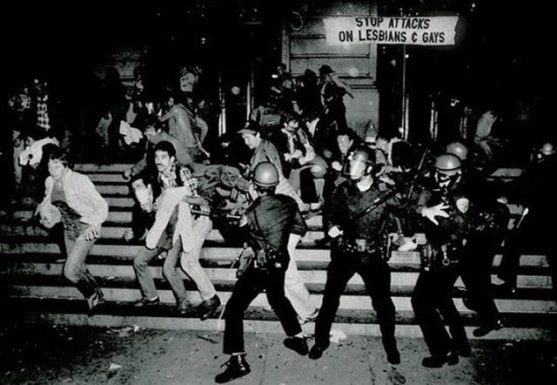A little more than a half century ago, a group of patrons at a New York bar decided they’d enough and ended up launching a campaign that became known as the Gay Rights Movement.
It’s why June is called Pride Month.
It might be hard to believe today, but there was a time in this country when people weren’t as forthcoming about their sexual orientation or sexual identity. But that didn’t keep them from coming together in safe spaces. One place was the Stonewall Inn, a “private” (which means a bouncer guarded the establishment) gay club owned by “Fat Tony” Lauria, a member of the Mafia, located in Greenwich Village. At the time, it was one of the largest gay clubs in the U.S. and it allowed attendees to dance together. There was a cover charge to get in, and people often used fake names when they signed the register.
LGBTQ people went to the Stonewall Inn, no matter their race, age, orientation or identity. It was illegal to serve alcohol in “disorderly” environments, and police considered LGBTQ people disorderly. Patrons and managers were usually arrested, therefore, management of these types of establishments would bribe officers, Mafia members and state liquor authority officials for advance warnings of when the raids were coming. That allowed employees to warn the patrons by turning on the lights in the establishment so people would stop dancing together or stand real close. They would stand at a friendly distance to be seen as friends and nothing more because the something more usually led to arrests.
And even though Stonewall Inn management paid off law enforcement, undercover officers entered the establishment on June 28, 1969 for a raid. The lights flashed telling customers five officers had entered the bar to join their four undercover colleagues. But the patrol wagon used to transport arrested people and confiscated alcohol took longer to get to Stonewall than expected. That extra time allowed a crowd of patrons and onlookers to grow outside. Reports say punches were thrown by transgender women and lesbians, which contributed to the rise of the mob.
Police officers hid inside the bar for 45 minutes and watched as the crowd grew and so did the first night of riots. A fire department and a riot squad were needed to alleviate the mob that ballooned to around 550 people.
In all the Stonewall Riots lasted six nights with patrons fighting back. The two most intense nights were the first and the last with businesses being looted on night No. 6. On the second night, 2,000 protestors had gathered and each night thereafter brought at least 500 to 1,000 people.
It’s meaningful to know that while the Stonewall Riots are an important moment, it wasn’t the only one for the Gay Rights Movement. But the Stonewall Riots are considered the turning point. Since 1950, other LGBTQ groups formed to address vitally important points such as employment, sharing a home with a same-sex spouse or partner, and everyday happenings that some may take for granted today. Also note the Gay Rights Movement coincided with other civil unrest in the U.S. such as the Civil Rights movement, second-wave feminism, and protests against the Vietnam War.
But the Stonewall Riots are why people organized and obtained a parade permit to commemorate the event in 1970 and every year after that. Media coverage of Stonewall also prompted LGBTQ members and entities in other U.S. cities to have their own parades. And they continue today with LGBTQ members proudly displaying their Pride with their own unique style, flags and other accessories that show how fabulous the community truly is.
Without the Stonewall Riots, other important LGBTQ events may not have happened in this country such as the Supreme Court rulings that
* American laws prohibiting private homosexual activity between consisting adults are unconstitutional (Lawrence v. Texas, 2003).
* the right to marry is guaranteed to same-sex couples (Obergefell vs. Hodges, 2015).
* the Civil Rights Act of 1964 protects LGBTQ employees from discrimination based on sex (June 15, 2020).
These pioneers have made it possible for LGBTQ Americans to truly live and dream of the lives they want with the spouses, homes and memorable moments others enjoy without thinking twice about them.
They are why we can say Happy Pride Month y’all!

